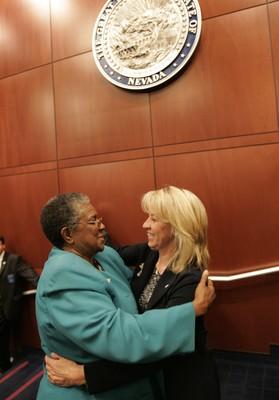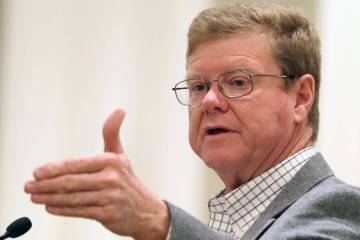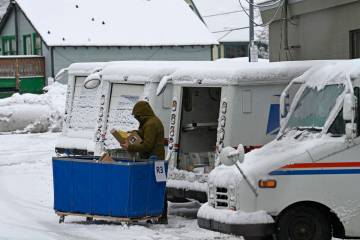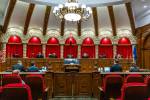Special delivery
Like a bad dream, the Nevada Legislature was back Tuesday evening.
This time, weary lawmakers finished their work.
They pushed through a handful of bills that missed a 1 a.m. deadline in the regular session of the 2007 Legislature on Tuesday, bringing to a close an unwanted and embarrassing special session in under four hours.
"As our special gift to you, we gave you a special session," Assembly Speaker Barbara Buckley, D-Las Vegas, said, addressing freshmen members of the lower house before it adjourned sine die at 8:46 p.m. "Now you have had two sessions."
Assemblyman Bob Beers, D-Henderson, sang an out-of-tune adaptation of "Summertime," leading Buckley to quip, "Now we know it is time to go home."
The Senate finished at 8:49 p.m.
"We voted, we won, we lost, but in the end I think we served the people of this state well," Senate Majority Leader Bill Raggio, R-Reno, told the gallery.
In declaring the special session, Gov. Jim Gibbons gave legislators from 5 p.m. until midnight to wrap things up. The quick finish was a relief after the previous night, which ran into the wee hours.
Under the Constitution, the Legislature meets every two years for no more than 120 days, a time limit that expired as lawmakers were in the middle of discussing and passing bills.
Only the governor can call a special session outside the 120 days. In calling for a special session, Gibbons said there were education issues left unresolved.
"While I had hoped we would finish on time, I have asked the Legislature to return to complete this unfinished business, which includes passing a performance pay plan that rewards good teachers based on student learning," Gibbons said.
The agenda proclaimed by Gibbons included three bills funding education programs that Assembly Democrats said were crucial. They said the bills arrived from the Senate too late at the end of the regular session to get them passed.
One bill contained $10 million for a pilot program to pay teachers for good performance; another contained $4.5 million for initiatives including after-school programs and education for the gifted and talented; and a third codified incentive pay for teachers in at-risk schools and hard-to-fill subject areas.
Gibbons' special session agenda, forged in intensive talks with legislative leaders, also included measures to raise judges' salaries, preserve streams in Northern Nevada, give the Millennium Scholarship to children of military members, study educational testing, issue special license plates, renovate the Lear Theater in Reno, establish a committee on mental health and allow counties to apply for money for courthouse security.
Legislative Counsel Bureau Director Lorne Malkiewich said the only cost of the special session was pay for lawmakers and printing costs. Because legislative staffers had worked into Tuesday during the regular session, they were being paid for the day, and there were no startup costs as the legislative building was already up and running.
Lawmakers' pay for the day totaled $8,608. The total cost of the special session was about $25,000, Malkiewich said.
The tension that was palpable in the building as the 1 a.m. Tuesday deadline approached for adjournment was noticeably absent during the special session. Most lobbyists had already left after determining that the few bills in play in the special session offered no opportunity for deal-making.
Raggio said the special session was made necessary simply because lawmakers ran out of time. The processing of bills between the houses could not be completed by staff quickly enough, he said.
But there was a suggestion that a measure Raggio wanted but that was not passed in the Assembly, $5 million for stream restoration for the Truckee River, was a factor in the need for a special session. It was part of the special session agenda.
Raggio said it was made clear to Assembly leaders two days ago that the money, which was included in Gibbons' recommended budget, was important to Senate leadership. When the bill was not passed out of the Assembly in the waning hours, many suspected the Senate intentionally slowed down the process of passing education bills the Assembly desperately wanted.
Raggio denied that any games were being played to get the stream money.
Assembly Ways and Means Chairman Morse Arberry, D-Las Vegas, said his panel didn't process the bill because of a belief the flood control was a local government issue. Senate leaders never said the bill was critically important to them, he said.
Another measure passed in the special session would allow a portion of $6 million included in the state budget for parole officers and other programs related to the early release of inmates to also be used for security improvements to the White Pine County courthouse. Gibbons wanted money to build a new courthouse because of the heavy use of the facility by inmates from Ely State Prison. No funding was provided by the Legislature in the regular session.
This special session provided $4 million for improved security at the courthouse.
Bills making their way out of the Legislature in the waning hours of the regular session included a pay hike for Supreme Court justices and District Court judges. The pay for Supreme Court justices will increase from $140,000 to $170,000 beginning in January 2009 for those winning election in 2008, and district judge salaries will increase from $130,000 to $160,000 on the same date.
School board members will also see a raise, to $750 a month for all Clark County School Board members.
A bill setting the policy for how empowerment schools will work, Senate Bill 238, also passed late Monday.
Senate Bill 471, making changes to the supervision and oversight of sex offenders, also passed. It contains provisions sought both by Gibbons and Senate Minority Leader Dina Titus, D-Las Vegas, including a provision that the worst, or Tier 3, sex offenders cannot reside within 1,000 feet of a place used primarily by children, including schools.
Additionally, all sex offenders convicted outside of Nevada will be required to submit DNA samples to local law enforcement upon their relocation to the state. The bill also provides GPS monitoring of Nevada's Tier 3 sex offenders who are on parole or probation.
The bill was also amended to resolve an issue regarding the Open Meeting Law and the Parole Board. The provisions require the panel to follow many of the requirements of the law, including notice to the offender of a hearing and the right of the offender to have a representative present.
Sen. Terry Care, D-Las Vegas, said the Parole Board still has the authority to remove an inmate from the hearing process at the request of a victim or a victim's family member who is testifying at the hearing.
A measure that didn't see approval was an Assembly proposal to raise more money for roads by calling for voters to decide in a ballot question whether to increase taxes to pay for road improvements. The proposal, which passed the Assembly on a 27-15 party-line vote, would have asked voters in 2008 whether they supported raising taxes on truckers, taxicabs and creating toll roads to further address the highway funding shortfall.
Assemblyman Kelvin Atkinson, D-North Las Vegas, had said the state needed to identify additional transportation funding sources.
The amended bill went to the Senate but did not get a hearing.
Another bill that Senate Republicans and Gibbons wanted would have made changes to the state Board of Education, including giving the governor the appointment authority over the superintendent of public instruction.
Senate Bill 540 was passed to the Assembly over the objections of Sen. Steven Horsford, D-Las Vegas, but did not get a vote in the lower house.
2007
Nevada Legislature






























